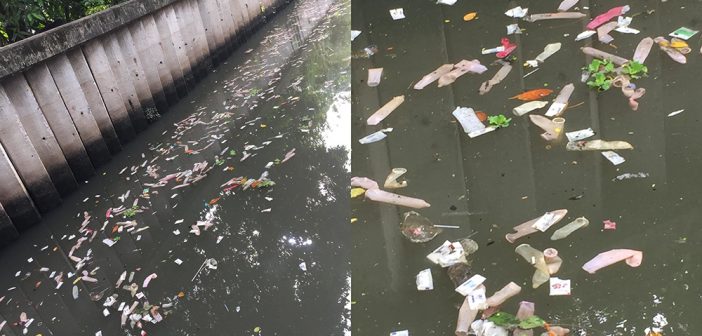Improper disposal of condoms, particularly those containing fresh semen and female sex fluids, poses significant health and environmental risks, particularly during Mumbai’s monsoon season. The heavy rains and flooding exacerbate these issues, leading to increased exposure and potential health hazards. This report examines the specific risks associated with such improper disposal, with a focus on the health risks to women, and explores the underlying reasons for inadequate disposal practices.
Health Hazards Associated with Improper Condom Disposal
Environmental Contamination
- Pathogen Transmission:
- Semen and Sex Fluids: Condoms containing semen and female sex fluids can harbor a range of pathogens, including sexually transmitted infections (STIs) such as HIV, herpes, and gonorrhea. When these condoms are disposed of improperly, pathogens can be released into the environment, particularly during heavy rains and flooding.
- Flooding Risks: In Mumbai, the monsoon season can lead to extensive flooding, washing away improperly disposed condoms into water bodies and public spaces. This increases the risk of disease transmission through contact with contaminated water or soil.
- Water Pollution:
- Contamination of Water Sources: Improperly disposed condoms can end up in rivers, lakes, and other water bodies, contributing to water pollution. Contaminated water can pose health risks to local populations, including the spread of waterborne diseases and the potential for exposure to harmful pathogens.
Health Risks to Women
- Infection Risks:
- Direct Contact: Women may come into direct contact with improperly disposed condoms in public spaces or during cleanup activities. This contact can lead to infections if the condoms are contaminated with pathogens.
- Reproductive Health: The exposure to contaminated materials can potentially affect reproductive health, leading to infections that may cause complications in pregnancy or impact overall female reproductive health.
- Pregnancy Complications:
- Increased Infection Risk: Pregnant women exposed to contaminated environments may face higher risks of infections that could affect their health and the health of their unborn child. Conditions such as bacterial vaginosis or fungal infections can be exacerbated by exposure to contaminated materials.
Factors Contributing to Improper Disposal
Lack of Awareness
- Public Education:
- Limited Awareness: There is often a lack of awareness regarding the environmental and health risks associated with improper condom disposal. Public education campaigns may be insufficient in reaching all segments of the population, leading to inadequate disposal practices.
- Misconceptions: Some individuals may not fully understand the risks posed by disposing of condoms in public areas or the potential health hazards associated with improper disposal.
Inadequate Disposal Facilities
- Absence of Facilities:
- Public Amenities: In many areas, particularly in lower-income neighborhoods, there may be a lack of proper disposal facilities such as sanitary bins or designated waste disposal sites. This absence leads individuals to discard condoms in public spaces or household waste without appropriate precautions.
- Waste Management: Inefficiencies in waste management systems can result in improper disposal of waste, including condoms. Inadequate waste segregation and processing facilities can contribute to the problem.
Socioeconomic Factors
- Economic Constraints:
- Access to Resources: Economic constraints can limit access to proper disposal facilities and public health resources. People in economically disadvantaged areas may lack the means to ensure proper disposal, leading to the use of inappropriate methods.
- Informal Settlements: In informal settlements and densely populated areas, space and infrastructure limitations can contribute to improper disposal practices.
Impact of Mumbai’s Monsoon Season
Exacerbation of Risks
- Flooding and Erosion:
- Rainfall Impact: The monsoon season in Mumbai brings heavy rainfall and flooding, which can exacerbate the spread of contaminants. Floodwaters can carry improperly disposed condoms over large areas, increasing the risk of environmental contamination and pathogen spread.
- Erosion: Heavy rains can cause soil erosion, washing away discarded condoms and potentially spreading contaminants further into residential and recreational areas.
- Public Health Challenges:
- Increased Exposure: Flooding can lead to increased exposure of individuals, especially in areas where floodwaters come into contact with improperly disposed waste. This exposure can heighten the risk of health issues related to waterborne diseases and infections.
- Emergency Response: The monsoon season can strain public health and emergency response systems, making it challenging to address contamination issues and implement effective cleanup efforts.
Mitigation Strategies and Recommendations
Public Awareness Campaigns
- Educational Programs:
- Awareness Initiatives: Implementing comprehensive public awareness campaigns about the importance of proper condom disposal and its environmental and health impacts can help reduce improper disposal practices.
- Community Engagement: Engaging with local communities to promote safe disposal practices and provide information about available disposal facilities can enhance public understanding and compliance.
Improved Disposal Facilities
- Infrastructure Development:
- Sanitary Bins: Increasing the availability of sanitary bins and designated disposal sites in public areas can provide convenient options for proper disposal of condoms and other sanitary products.
- Waste Management: Enhancing waste management infrastructure to ensure proper segregation and processing of waste can help mitigate the risks associated with improper disposal.
Policy and Regulatory Measures
- Regulation Enforcement:
- Health Regulations: Enforcing regulations related to the disposal of sanitary products and improving waste management policies can address systemic issues contributing to improper disposal.
- Community Support: Providing support for communities affected by inadequate disposal facilities and promoting local initiatives for proper waste management can contribute to improved public health outcomes.
Conclusion
Improper disposal of condoms containing fresh semen and female sex fluids poses significant health and environmental risks, especially during Mumbai’s monsoon season. The combination of inadequate disposal practices, lack of awareness, and the exacerbating effects of heavy rainfall creates a challenging scenario for public health. Addressing these issues requires a multifaceted approach, including public education, improved disposal infrastructure, and effective policy measures. By enhancing awareness and providing appropriate disposal options, the risks associated with improper disposal can be mitigated, leading to improved health outcomes and environmental protection.





